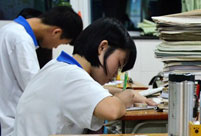 Luoyang aims to become 'Chinese Culture City'
Luoyang aims to become 'Chinese Culture City'
 Century-old jade disc found confirms ancient legend
Century-old jade disc found confirms ancient legend
 A serious mind behind Chinese leader
A serious mind behind Chinese leader
 Panda Cubs to Predict 2014 World Cup Winners
Panda Cubs to Predict 2014 World Cup Winners
 China Southern Airlines flight attendants win titles in service contest
China Southern Airlines flight attendants win titles in service contest
 Pupil's performance art persuades people to stop smoking
Pupil's performance art persuades people to stop smoking
 Nie Chenxi's clay tigers
Nie Chenxi's clay tigers
 Children's Day wishes
Children's Day wishes
 Chinese Kung Fu charms Silicon Valley
Chinese Kung Fu charms Silicon Valley
 Tranquil Yankou ancient town
Tranquil Yankou ancient town
More than one year ago, Chinese Premier Li Keqiang chose India as his first overseas destination since taking office.
Now, less than two weeks after a new government takes office in New Delhi, China sent Foreign Minister Wang Yi as special envoy to India where he held "productive and substantive" talks with Indian officials.
In fact, the past year has witnessed the most frequent high-level exchanges between China and India in nearly 60 years because they clear know that mutual benefits and common development can only be achieved through building a strategic cooperative partnership, instead of rivalry.
China and India are two important forces which are on the ascendancy in the process of global multi-polarization. Their ties are a bilateral relationship with great dynamics and potentials in the 21st century.
Politically, the two countries pledged to maintain the momentum of exchange of high-level visits, strengthen strategic coordination on bilateral relations and work out strategic plans, in order to give guidelines to the development of bilateral relations.
Wang's trip, with aims to cement the existing friendship and explore further cooperation between China and India, is expected to pave the way for a visit by Chinese President Xi Jinping to India later this year.
Wang, who visited India after the Indian new government was sworn in, said the China-India relations are facing a new start and new opportunities, adding that he came to India to emphasize that China welcomes, supports and wishes for India's development.
"Being ancient Eastern civilizations at similar development stages, China and India are both pursuing the great dream of national renewal, dreams that are interconnected and mutually compatible," Wang told Indian paper The Hindu.
Based on such similarity, for China and India, with a combined population that accounts for nearly 40 percent of the world's total, much is to be expected from their pragmatic cooperation.
The mutual complementarity of the two economies provides great potential for China and India, one being a global manufacturer and the other a major service provider, to jointly boost cooperation in bilateral trade, investment, financial services and new and high technologies.
Besides, both being members of the BRICS (namely, Brazil, Russia, India, China and South Africa) and emerging economies, China and India can cooperate and coordinate closely within regional and global frameworks.
The two countries are also expected to grasp the opportunity of celebrating the 60th anniversary of the declaration of the Five Principles of Peaceful Co-existence and the Year of Friendly Exchanges to deepen bilateral exchanges.
Therefore, at such good momentum of bilateral relations, it is widely believed that China and India can put aside their differences on such thorny issues as border disputes to make sure they will not hinder the partnership and friendship between the two countries, which will be conducive to world and regional peace and stability.
 Magnificent Hutiao Gorge
Magnificent Hutiao Gorge  Heat waves hit China
Heat waves hit China Love at the construction site
Love at the construction site Graduation photos bring memories back to life
Graduation photos bring memories back to life Art school students present works in Nanjing
Art school students present works in Nanjing Xinjiang's first high-speed railway goes on trial run
Xinjiang's first high-speed railway goes on trial run 3D Sea-life Themed Art Garage unveiled in Zhengzhou
3D Sea-life Themed Art Garage unveiled in Zhengzhou
 Creative Photos go viral during graduation season
Creative Photos go viral during graduation season Students in last-minute effort for Gaokao
Students in last-minute effort for Gaokao Dali, an ideal summer vacation destination
Dali, an ideal summer vacation destination Xichan Temple's little monk hit the Internet
Xichan Temple's little monk hit the Internet Monologue of a modern dancer
Monologue of a modern dancer College girl proposes to boyfriend on Weibo
College girl proposes to boyfriend on Weibo Special operation members in counter-terrorism training
Special operation members in counter-terrorism training American football brings manhood out of boys
American football brings manhood out of boysDay|Week|Month